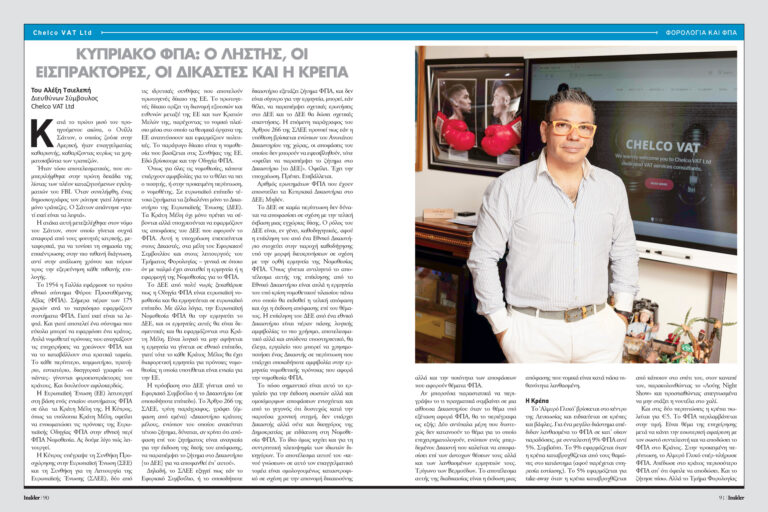Limassol – The last chance for companies in Cyprus to report DAC6 relevant information to the Authorities is the end of this month.
Failure to comply with DAC6 by 30 November 2021 will result in the imposition of administrative fines for late submission. It could also mean facing significant sanctions under local law in EU countries and reputational risks for businesses, individuals, and intermediaries.
The Directive on Administrative Cooperation (DAC), is an EU-level initiative the purpose of which is to enhance transparency in the field of taxation and fight against aggressive tax planning. It applies to cross-border tax arrangements, which meet one or more specified characteristics (hallmarks), and which concern either more than one EU country or an EU country and a non-EU country. It mandates a reporting obligation for these tax arrangements if in scope, no matter whether the arrangement is justified according to national law.
The relevant Directive (EU) 2018/822 represents the 6th modification of DAC, thus it is called DAC6.
DAC6 has been transposed into Cyprus law through the amendment of the Law on Administrative Cooperation in the Field of Taxation of 2012, enacted on 31 March 2021.
On 29 October 2021, the Cyprus tax authorities also released a new publication, which implements the EU directives on reportable cross-border arrangements. The guidance (only available in GR) can be downloaded here.
What is included in the updated guidance?
The guidance introduces details on the definition of what is included on cross border transactions and who are the intermediaries.
New information about when the Cyprus Tax Department considers a transaction to be sufficiently finalized for reporting purposes.
Detail on what due diligence intermediaries are required to carry out before reporting.
In September 2021, the Tax Department announced that there would be no imposition of administrative fines for overdue submission of DAC6 information that will be submitted until the 30 November 2021, in the following cases:
Reportable cross-border arrangements that have been made between 25 June 2018 and 30 June 2020 and had to be submitted by 28 February 2021.
Reportable cross-border arrangements that had been made between 1 July 2020 and 31 December 2020 and had to be submitted by 31 January 2021.
Reportable cross-border arrangements made between 1 January 2021 and 31 October 2021, that had to be submitted within 30 days from the date they were made available for implementation or were ready for implementation or the first step in the implementation has been made, whichever occurred first.
Reportable cross-border arrangements for which secondary intermediaries provided aid, assistance or advice, between 1 January 2021 and 31 October 2021 and had to submit information within 30 days beginning on the day after they provided aid, assistance or advice.
The first periodic report for marketable arrangements that had to be submitted by 30 April 2021.
According to the Cyprus Tax Department, the rationale behind DAC6 is the following:
“Member States find it increasingly difficult to protect their national tax bases from erosion as tax-planning structures have evolved to be particularly sophisticated. Such structures commonly consist of arrangements, which are developed across various jurisdictions and move taxable profits towards more beneficial tax regimes or have the effect of reducing the taxpayer’s overall tax bill.
As a result, Member States often experience considerable reductions in their tax revenues, which hinder them from applying growth-friendly tax policies. It is therefore critical that Member States’ tax authorities obtain comprehensive and relevant information about potentially aggressive tax arrangements.
Such information would enable those authorities to react promptly against harmful tax practices and to close loopholes by enacting legislation or by undertaking adequate risk assessments and carrying out tax audits. However, the fact that tax authorities do not react to a reported arrangement should not imply acceptance of the validity or tax treatment of that arrangement.
For this reason, the Council of the European Union has adopted the Directive 2018/822 for amending the Directive 2011/16/EU with regard to the mandatory automatic exchange of information in the field of taxation.”




